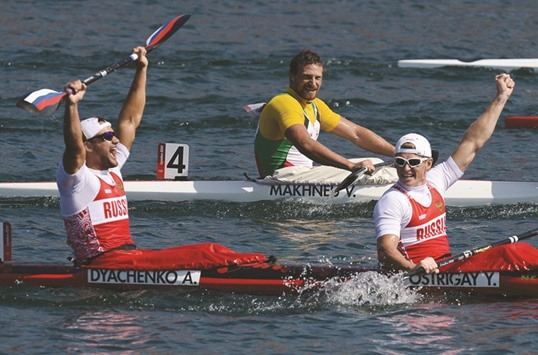The International Rowing federation (FISA) announced yesterday that 22 of 28 Russian rowers have been banned from competing in the Rio Games, based on criteria fixed by the International Olympic Committee (IOC) over state-sponsored doping in Russia. With just six rowers still eligible, Russia can only compete with one boat in Brazil, a men’s coxless four, FISA said.
Earlier, Seven athletes including a canoeing gold medallist became the latest Russian competitors to be banned from next month’s Rio Olympics. Five canoeists and two in modern pentathlon were barred, taking the number of Russians banned from the Games — which start in just 10 days — to at least 42 since Sunday.
The bans followed a controversial decision at the weekend by the International Olympic Committee (IOC) not to suspend all Russian competitors, instead leaving it up to each sport to decide what to do.
The IOC has faced fierce criticism from anti-doping leaders over the move, including accusations that it failed to show leadership in the battle for drug-free sport. IOC president Thomas Bach insisted the unprecedented eligibility criteria put in place for Russians had teeth, with the country’s athletes having to clear “the highest hurdles” before going to the Games, which start on August 5.
International Canoe Federation (ICF) secretary general Simon Toulson issued a strong rebuke to suspected dopers. “If you step out of line you won’t make the start line,” he said in a statement.
The ICF said it had taken “swift action to remove five Russian canoe sprint athletes from the Rio Olympic Games following the release of additional information naming those implicated by the McLaren report”.
The report by Canadian law professor Richard McLaren for the World Anti-Doping Agency (WADA) detailed an elaborate doping system in Russia directed by the sports ministry that affected more than 30 sports. The banned five included Alexey Korovashkov, a five-time world champion who won a bronze medal in London four years ago, and Alexander Dyachenko, who took gold in a doubles kayak sprint.
“This is a bitter blow for the Olympic movement and we are saddened that our sport is implicated. We have taken swift action and removed all offending athletes where doping evidence exists,” said Toulson. “The ICF will continue its strong zero-tolerance stance and remove all athletes that contravene its rules in anyway.”
Modern pentathlon’s governing body said two more Russians nominated for Rio — Maksim Kustov and Ilia Frolov — had been implicated in the McLaren report and “are no longer eligible to compete at the 2016 Olympic Games”.
The report linked both to the so-called “Disappearing Positive Methodology”, meaning their positive drug tests at a Moscow laboratory in 2014 were never reported, according to the WADA report.
With the Rio Olympics fast approaching sports federations have precious little time to deal with Russian competitors, some of whom are already in Brazil.
In addition to the ban on Russia’s entire track and field team over doping, seven swimmers, two weightlifters, a wrestler and three rowers have all also been barred. Russia’s rowing federation said it would appeal. Four-time world breaststroke champion Yulia Efimova announced plans on Monday to also appeal her ban at the Court of Arbitration for Sport (CAS).
Matthieu Reeb, CAS secretary general, told AFP in an email it had yet to receive the appeal. The court and federations face a race against the clock to manage a flurry of Russia doping cases before the opening ceremony.
Russian sports minister Vitaly Mutko — a key figure in the McLaren report who has been banned from Rio — has voiced confidence that the “majority” of the country’s 387-member team would be declared eligible for Rio.
In some rare good news for Russia, the International Shooting Sport Federation said that all 18 competitors nominated by Russia had been cleared for Rio because they had no positive drug tests on their record and were not mentioned in the McLaren report.
IOC chief Bach says the Olympic body stopped short of a blanket ban to protect clean Russian athletes and safeguard the right to individual justice.
That rationale sparked a furious response from some of the Olympic movement’s leading figures and countries.
Canada’s anti-doping chief Paul Melia called the decision disheartening, while the head of the US anti-doping agency, Travis Tygart, blasted the IOC for failing “to take decisive leadership”.
Most Russian competitors will fly out on Thursday, but it remains to be seen how many will actually take part in the Games because several federations have yet to weigh in.

This file photo taken on August 11, 2012 shows Russia’s Yury Postrigay (right) and Alexander Dyachenko celebrating after winning the gold medal in the kayak double 200m men’s final during the London 2012 Olympics. Canoeing’s governing body has banned five Russians, including a gold medallist and a five-times world champion, from next month’s Rio Olympics. The five were named as Elena Aniushina, Natalia Podolskaya, Alexander Dyachenko, Andrey Kraitor and Alexey Korovashkov. (AFP)
